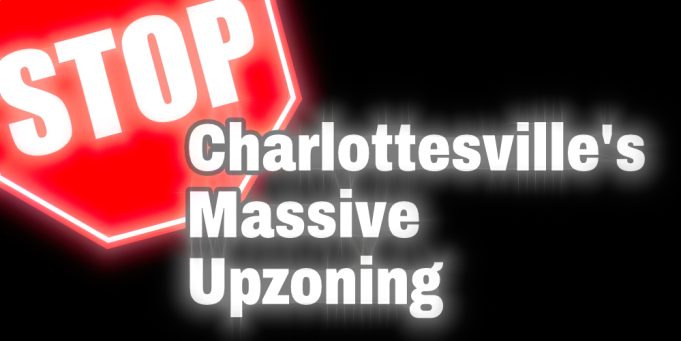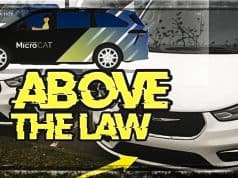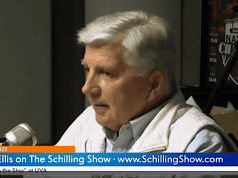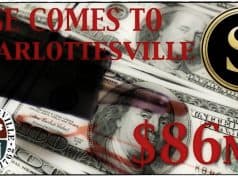by: Mary Summers Whittle
 In just a few months, Charlottesville’s city council may well approve the most extreme upzoning plan in the country.[1][2] Laid out in a recently released “final draft” zoning ordinance, the plan’s key provisions include:
In just a few months, Charlottesville’s city council may well approve the most extreme upzoning plan in the country.[1][2] Laid out in a recently released “final draft” zoning ordinance, the plan’s key provisions include:
- eliminating all single-family-only zoning
- allowing the construction of 4, 6, or 8 housing units on all residential lots, with the option to double those numbers
- permitting residential lots to be subdivided into “sublots” of as little as 1/17th of an acre, which can then be maximally developed; and
- scrapping requirements that developers provide tenants with parking spaces (i.e., all parking could be on-street).
It’s a doozy of a proposal, with huge implications for the city’s future: At full implementation, the new zoning would triple Charlottesville’s population and transform our 10-square-mile city into one of America’s most densely populated urban areas.
Questionable Plan
The proposed zoning raises any number of questions. But there’s one that—because it entails such transparent foolishness, profound irresponsibility, and seemingly clear disregard for state law—has long particularly bothered me. The question is this: Why didn’t City officials do any transportation planning to support their massive upzoning plans? After all, it’s beyond obvious that a far more densely populated city will require new and carefully planned transportation infrastructure: More people will require more and better sidewalks, bike paths, and systems of public transit, along with bigger and better roads, intersections, and bridges.
More significantly, though, land-use supportive transportation planning isn’t just a good idea, it’s the law: Virginia Code § 15.2-2223, which governs the comprehensive planning process that underlies zoning, clearly requires that localities create complementary land-development and transportation plans. Indeed, § 15.2-2223 (B) states that as part of the comprehensive planning process, a locality “…shall develop a transportation plan that designates a system of transportation infrastructure needs and recommendations that include the designation of new and expanded transportation facilities and that support the planned development of the territory covered by the plan.”
In seemingly clear noncompliance with the law, however, Charlottesville officials made no such supportive plans: Although the land use portion of the City’s comprehensive plan contains the blueprints for a radically denser, “upzoned” city, the transportation portion of the plan consists of little more than a collection of vague, hopeful statements and a collection of transportation projects dating from 2015 and 2016, their status marked “TBD.”
Not surprisingly, the City’s records show that no transportation consulting or engineering firms were engaged at any point during the city’s pre-zoning comprehensive planning process, and in soliciting for firms to undertake the comprehensive planning and upzoning processes, Charlottesville officials categorized the city’s transportation plans as “already completed.”[3] It couldn’t be clearer: The city made no transportation plans to support their upzoning plans.
Acting in Bad Faith
Here’s where things get even more disappointing. Virginia Code § 15.2-2223 also states that prior to the adoption of a comprehensive plan, (which, again, lays the groundwork for any pursuant zoning), localities are required to send the transportation portion of the plan to the Virginia Department of Transportation (VDOT). VDOT, in turn, is supposed to provide written comments to the locality on the “consistency” of the transportation and land use plans.
As we know, however, Charlottesville’s land use and transportation plans are wildly inconsistent. So how did they slip past VDOT’s review? Easy: FOIAed communications show that city staff requested a super-fast turnaround from VDOT officials, and, critically, did not tell VDOT officials about the planned upzoning. That’s right: the transportation plan the city sent to VDOT makes not a single reference to any planned upzoning.
In fact, the city’s communications to VDOT officials indicated not simply that Charlottesville had no current plans to change, but that it couldn’t change even if it wanted to.
“Development is pushed out to the surrounding communities,” City officials wrote in a brief narrative provided to VDOT officials. “Because of the built-out nature of the city, constructing new roadways or widening existing roadways are either not viable, palatable, or affordable.”
More Non-Compliance
It’s a great shame that Charlottesville officials failed to inform VDOT officials of their planned mega-upzoning. Had they done so, those officials would surely have informed the city’s leadership that the new land use plans wildly surpass the legal threshold for a mandatory traffic impact analysis, as spelled out in Virginia Code § 15.2-2222.1 and the corresponding administrative code, § 24VAC30-155-30 . Had city officials engaged in a traffic impact analysis, they’d have been forced to consider such critically important issues as how the transportation system is or is not currently functioning; what changes to the transportation system will likely be necessitated by the pending upzoning; and how the city and surrounding counties might coordinate their transportation plans with one another. That is, compliance with the law would have forced city officials to engage in sensible, responsible transportation planning.
Defiant noncompliance
As a final note, it’s worth pointing out that in Dec. 2022, just prior to a court-mandated new adoption of the city’s comprehensive plan, VDOT officials, with approval from Virginia’s Office of the Attorney General, reminded the city of the need to comply with the review requirements of § 15.2-2223, § 15.2-2222.1 and, § 24VAC30-155-30. City officials refused to do so, and moved forward with adopting a comprehensive plan and sweeping environmental action amendment in what appears to be open noncompliance with the relevant statutes.
More Questions
Why are Charlottesville’s leaders unwilling to comply with the state’s entirely sensible transportation planning laws? State law envisions coordinated land use and transportation planning because such planning is clearly the most beneficial to municipalities and their residents. Charlottesville’s planners have utterly failed the city’s citizens, in this regard.
Call me old-fashioned, but I believe that local governments have a responsibility to abide by state law as well as to strive to take actions that will both protect and benefit their citizenry. It’s time for C’ville’s citizens to start asking some serious questions about the city’s behavior—and demanding some serious answers.
[1] Zoning laws regulate how property can be used or developed; upzoning means changing those laws to permit greater intensity of use.
[2] Arlington, VA recently passed the nation’s most permissive zoning ordinance, eliminating single-family-only zoning and allowing the construction of four or six dwellings per lot in all County neighborhoods. Of the three states and eight municipalities that have made similar “upzoning” changes, only Portland allows six dwellings per lot, and only if some of the dwellings are affordable.
[3] Question for another day: Why was the firm that led the planning process, Rhodeside Harwell Inc., hired in the absence of a competitive bidding process, as required by state procurement law?









I wonder what the City officials are saying today in regards to this editorial which certainly challenges the legality of the city wide upzoning our officials are about to vote for.
This upzoning was pushed through by the Bolshevik organization known as the legal aid justice center and the intention was to torpedo wealthy white neighborhoods with “affordable” section 8 voucher apartment tenements. I think the policy is atrocious, but the most visible and hilarious execution of this new zoning has caused outrage by the idiot white liberals that supported this in the first place. The by-right development of the Dairy Market Phase 2, which will provide 1000 units and high density commercial/residential to 4 square blocks that are currently occupied by low density/industrial and parking lots. The white liberals are now outraged because of the potential to raise property values for their pet minorities living in the 10th and page, which may lead to them cashing out and moving away. That is akin to a war crime to white liberals. The idea that a historically dangerous and violent neighborhood might improve and the current residents may get a pay day, and as a result the neighborhood might have white residents, is the worst thing they’ve ever heard. The signs they’ve put up in their lily white neighborhoods protesting this development are hilarious. I keep tearing them down and throwing them over the railroad bridge as I’m walking around town.
Dear Former Liberal, you are obviously unaware that one the people driving this radical plan was the Leader of the Student Republican Party at UVA….hardly a Bolshevik. You are also unaware that there has been a large contingent of residents who have been asking for appropriate and fact-based development for many years. What is happening with displace people many people city-wide , not just the 10th and Page community (which is not all Black) due to the rising assessments and new taxes that will be need to support the plan. Not everyone wants to “cash in” on what we consider our homes. This whole process has been driven by the money interests in Charlottesville who have successfully hood-winked Social Justice Warriors into thinking that those same money interests are going to magically give them affordable housing (despite all the facts to the contrary).
Thank you, Ms. Whittle, for your informative article. Many other serious concerns have been voiced about this hideous destructive power grab in the guise of caring for the poor. I hope many of our people will voice their questions at the city planning meeting this afternoon.
And thank you, Mr. Shilling for the post.